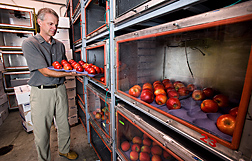| Read the
magazine
story to find out more.
|
| 
Plant physiologist Jim Mattheis places apples
treated with 1-MCP into a controlled atmosphere chamber to evaluate apple
quality after extended periods in storage. Click the image for more
information about it.
|
|

|
ARS-Studied Gas Helps Apples Stay Crisp
By Jan Suszkiw
October 17, 2007 A mushy apple makes a disappointing
snack. And despite extensive precautions taken to properly store freshly picked
fruit and market it to consumers in a timely fashion, mushy apples can still
happen.
Now, thanks in large part to Agricultural Research Service (ARS) studies, a gaseous compound called
1-MCP is helping prolong the fruit's quality and crispness.
1-MCP works by blocking ethylene, a colorless, odorless gas that naturally
regulates ripening and aging, according to
James
Mattheis, a plant physiologist in the
ARS
Tree Fruit Research Laboratory at Wenatchee, Wash.
There, starting in the mid-1990s, Mattheis coordinated studies that were the
first to show that 1-MCP prevents superficial apple scald, a peel-discoloring
disorder that's a major storage problem. That finding, in turn, has led to
1-MCP's use as an alternative to preventing apple scald with diphenylamine, a
chemical antioxidant that requires close monitoring.
Mattheis' studies also showed that 1-MCP can inhibit fungal rots in apples
stored under controlled-atmosphere (CA) conditions, which use specific mixtures
of oxygen and carbon dioxide to slow ethylene production.
Commercial use of 1-MCP, marketed since 2002 as the product SmartFresh, has
helped reduce fungicide use in apples. Maine's 2004 apple crop, for example,
saw a 43 percent decrease in fungicide use. And on CA-stored Red Delicious and
Granny Smith apples, 1-MCP treatments effectively prevented scald without
diphenylamine.
Under a trust-fund agreement with the
Washington Tree Fruit Research
Commission, Mattheis evaluated the gas on Gala, Red Delicious, Golden
Delicious, Braeburn, Granny Smith, Fuji and Pink Lady apples. His studies
identified the best application methods and dosages to use for each variety,
and also showed their physiological responses to the regimens.
1-MCP-treated apples generally stayed firm for three to six months longer
than untreated controls in CA-storage conditions. Red Delicious apples, for
example, stayed crunchier for two to three weeks longer than untreated controls
when removed from storage.
Read
more about the research in the October 2007 issue of Agricultural
Research magazine.
ARS is the U.S. Department of
Agriculture's chief scientific research agency.